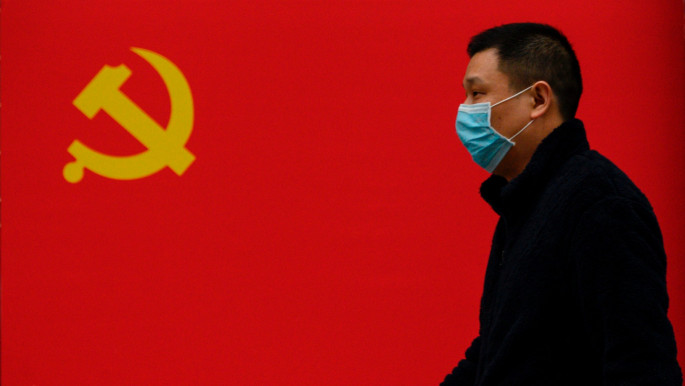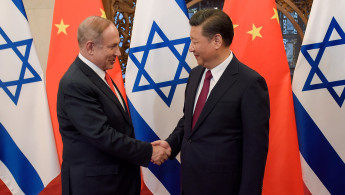US puts the brakes on burgeoning Israel-China ties
But even as grievances between the US and China grow, it is widely expected that Israel will follow Washington, its long-term ally, though Beijing happens to be the Middle Eastern nation's third largest trade partner.
Recently, Tel Aviv has rejected an almost confirmed bid from the prestigious Hong Kong firm, Hutchison Whampoa, to construct one of the world's largest desalination plants in Israel. Known as Sorek-2, this important project would have the potential capacity to produce 200 million cubic meters of water annually, meeting around a quarter of Israel's water needs.
However, right after a short visit by the US Secretary of State Mike Pompeo, the Israeli government seems to have given in to US pressure as the contract to build and operate the $1.5 billion infrastructure project was given to a local Israeli company IDE Technologies.
Ostensibly, the signal from Washington was that if Israel let China control any more infrastructure it would result in a reduction of intelligence sharing from the US and cut back security co-operation with Tel Aviv if it does not review its commercial deals with Beijing.
 |
Israel finds itself in the middle of a growing tug of war between Beijing and Washington |  |
These days, Washington is advising its partners in the Middle East to reject any Chinese bids or investments related to building infrastructure or taking over businesses. Last month, the Trump administration had also prepared a 16-page document on revising terms with China over the origins of the coronavirus pandemic and reviewing Beijing's overseas investments.
Over the past decade, China-Israel trade ties have been growing steadily and got an upgrade with the China-Israel Innovative Comprehensive Partnership in March 2017 during a visit by Israeli Prime Minister Benjamin Netanyahu to China.
 |
|
| Read more: Covid-19 diplomacy: Mapping China's Health Silk Road in the Middle East |
Since then, business ties have spiked from around $10.9 billion in 2014 to $14 billion in 2018 and remained on an upward trajectory ever since. If Israel starts cutting back its business ties with China now, the following economic sectors will be badly affected.
First, the most significant setback would be in the sector of ports and shipping. The new container terminal of the Port of Haifa was to be leased out to the Shanghai International Port Group (SIPG) for a 25-year term starting from 2021.
Apparently, the Israeli Ministry of Transportation now plans to reconsider this 2015 deal with the SIPG as China's involvement is considered to be sensitive by the US. Port handling could facilitate intelligence-gathering as the harbour areas include an Israeli naval base which often hosts the US Sixth Fleet and naval drills take place regularly.
As Gary Roughead, a retired US Navy Admiral has explained to Israeli media, "ports are high-tech" and port operators "have control systems and the data that goes with it." Therefore, port handling could give China access to Israeli-US military communications.
Meanwhile, China also has some investments in the Israeli port of Ashdod. Chinese access to sensitive infrastructure projects irks the US administration, and the desalination plant that Hong Kong firm CK Hutchinson was supposed to build was quite near an Israeli air base and nuclear research facility.
 |
Washington is advising its partners in the Middle East to reject any Chinese bids or investments related to building infrastructure |  |
Second, there will be a great impact on Israel's telecommunications sector as Chinese companies were about to launch 5G facilities there, and the Israeli Security Agency has recently disallowed their involvement. Even this move by Tel Aviv came after the US Ambassador to Israel, David Friedman, discussed the matter with the Israeli Communications Minister Yoaz Hendel and Chairman of the Knesset Foreign Affairs and Defence Committee Zvi Hauser.
Releasing a report in March, Israel's Institute for National Security Studies announced that, "In view of the absence of Chinese technology from previous generations of communications infrastructure in Israel, and despite the lack of clear official announcements by the Israeli government on the matter, the likelihood of its 5G infrastructure being built with Chinese technology is low to non-existent."
 |
|
| Read more: How will the EU respond to Israel's West Bank annexation plans? |
Third, China has been heavily involved in the start-up sector. Having no energy industry, Israel had encouraged investment from Beijing in its innovative start-ups and infrastructure projects that would serve to enhance the reach of the Belt and Road Initiative (BRI).
From the year 2016 to 2020, China has worked closely with Israeli tech companies and acquired sizable stakes in various start-ups. This field has complemented China's focus on innovation and artificial intelligence and both countries have had a 'comprehensive innovation partnership' agreement since 2017.
 |
Over the past decade, China-Israel trade ties have been growing steadily |  |
According to a Rand Corporation analysis, the US should be particularly concerned about these Chinese investments in Israel. The report has specified that, "Activity has been significant in the hi-tech sector, in which Chinese investment of venture capital doubled from US$500 million in 2014 to US$1 billion in 2016. Israeli tech start-ups received Chinese investment of US$325 million in the first three quarters of 2018, up 37 per cent from a year earlier."
Disappointed by the impending decline in China-Israel economic ties, Amir Gal-Or, managing partner of the Infinity Group, an Israeli-Chinese venture capital fund investing in both countries, feels that, "Saying that we must choose sides between the US and China is irresponsible. We need to make adjustments and pay attention to American sensitivities to things like defence or infrastructure projects but, in most cases, it is not about choosing sides".
 |
|
| Read more: China in the Middle East: Tourism and soft power |
Finally, Chinese companies have been prominent in the Israeli construction sector since 2007 when the China Civil Engineering Construction Corp first completed a tunnel-system linking southern Haifa with its northern side. Lately, there have also been reports about China building new rail links there.
China's presence is widespread in the country and even Israel's largest dairy producer, Tnuva is owned by a Chinese firm, the Bright Food Group.
In a move to review business links, Israel has constituted an advisory committee to evaluate the national security risks from prospective foreign investments. Around 11 out of 92 Chinese business deals in Israel were found concerning, such as the expansion of the Ashdod port, partial construction and operation of part of the Haifa port, construction and operation of the Tel Aviv light rail, and the digging of the Carmel Tunnels near Haifa.
Considering the level of China's presence in Israel, it may not be doable for both nations to snap off ties completely, but neutrality is impossible in the current scenario as any negative trend in US-China ties has a backlash on Israel.
According to Jon Alterman, senior vice president and director of the Middle East Program at the Center for Strategic and International Studies in the US, "As US-China relations become more tense, what Israel sees as natural growth in its relations with China is going to become more contentious."
According to a Pew research survey, 66 percent of Israelis view China favourably due to its growing economic clout and influence in the Middle East. Israel would have played a pivotal role in the BRI as a tech powerhouse and a key destination, but after this setback it can be expected that for the time being it would only maintain cultural and academic ties and continue some benign business deals with China.
Follow her on Twitter: @sabena_siddiqi



